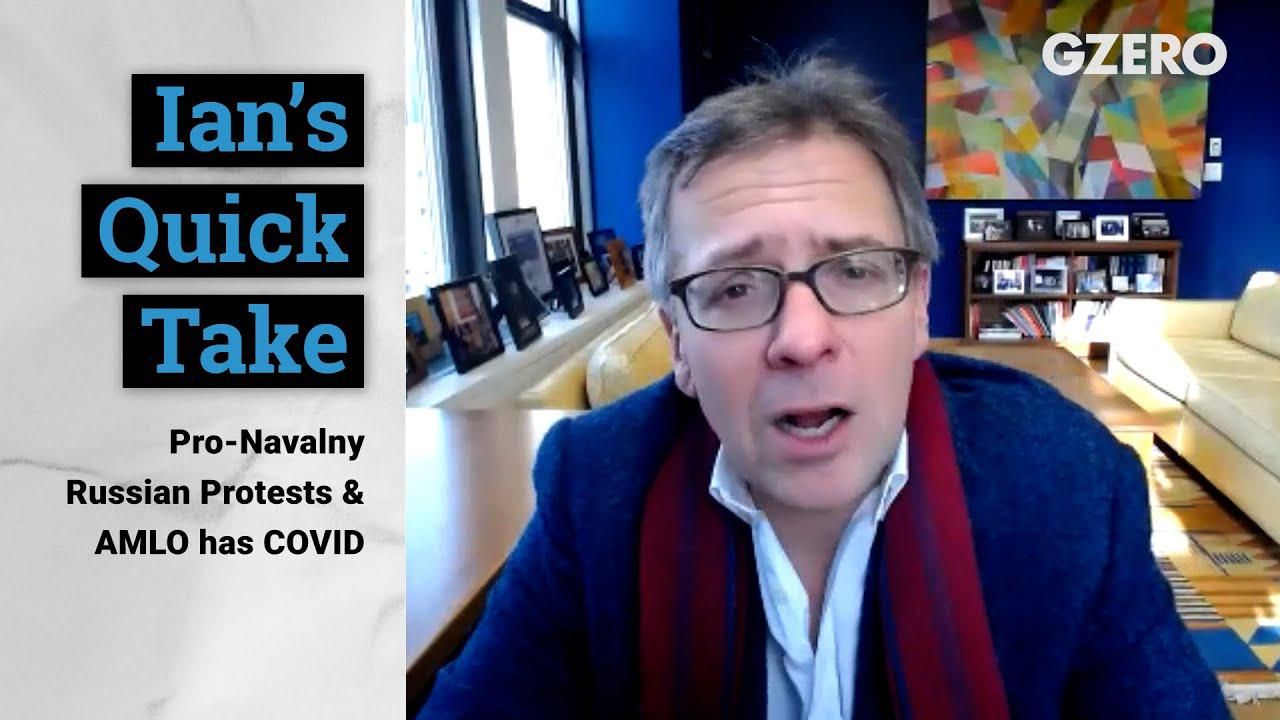Quick Take
Quick Take: Pro-Navalny Russian protests make Putin defensive; AMLO's COVID diagnosis

Ian Bremmer: Pro-Navalny Russian Protests & Putin | AMLO COVID Diagnosis | Quick Take | GZERO Media

Ian Bremmer's Quick Take:
Russian opposition leader Navalny in jail. Hundreds of thousands demonstrating across the country in Russia over well over 100 cities, well over 3000 arrested. And Putin responding by saying that this video that was put out that showed what Navalny said was Putin's palace that costs well over a billion dollars to create and Putin, I got to say, usually he doesn't respond to this stuff very quickly. Looked a little defensive, said didn't really watch it, saw some of it, but it definitely wasn't owned by him or owned by his relatives.
And in the investigation itself, it said it was actually in a holding company by people linked to the Kremlin as opposed to Putin himself. But the hundred million people that have watched it, don't find Putin very credible on this. The interesting thing is the Kremlin clearly sees Navalny as a threat. They're responding in a more defensive way than I've seen the Kremlin respond to really anything since Putin has been president on the domestic front. And I don't know if that means that they can't kill him while he's under detention or whether they feel like they have to. Certainly, it makes it much harder for them to let him go. I think it makes it more likely that he's detained for a longer period of time or he's convicted of some ginned-up crimes. But the influence that he has across the country is actually growing.
And that probably means a harder fist from the Russians in the kind of response to local opposition. Keep in mind the economy's not doing very well. Nobody's is, but Russia's in particular right now, and Putin's approval ratings are not what they were when he first annexed Crimea for example.
Final point Mexico, you may have seen the news, Andres Manuel Lopez Obrador, the president has contracted COVID. So many world leaders have come down with it. Even with the most extraordinary capacity to try to protect these people, coronavirus is incredibly transmissible. And a lot of these leaders in the governments aren't taking it as seriously as they should. That certainly is true of the Mexican president or the Brazilian president or the American president or the UK prime minister. All of whom have gotten coronavirus, though, I would say the French president's taken it quite seriously and he still got it.
But specifically in Mexico, this is important because Lopez Obrador himself controls so much of the decision-making in the country. There's no real functioning cabinet in Mexico, it's all the Mexican president. And the direction and the details of policy in Mexico are not about his ministers, it's about him. So, if Trump had been incapacitated for a few weeks, it wouldn't have much impact on American policy. He didn't do it.
In Brazil, same thing. All the economic policy was largely given to the key ministers Bolsonaro Doesn't really understand economic policy. In Mexico, whatever you think of Lopez Obrador, he's doing it. And so if he's laid up for a long time or in the worst case, if he dies, this is actually going to be a really significant problem for the Mexican government, where there is no obvious successor and very little capacity for governance outside of the Mexican president himself. Let's keep in mind, he's 67 years old. He had a heart attack in 2013 and supposedly suffers from hypertension. So, you put all that together, this is actually something to watch. He gets the best medical care of anybody in Mexico, but it's still something to be concerned about and I suspect we're going to see market reaction to that.
5: US President Donald Trump added five new countries – Burkina Faso, Mali, Niger, South Sudan, and Syria – to the list of nations banned from traveling to the US.
With the release of its National Security Strategy, the Trump administration has telegraphed how the US intends to engage with allies, and what it expects from them.